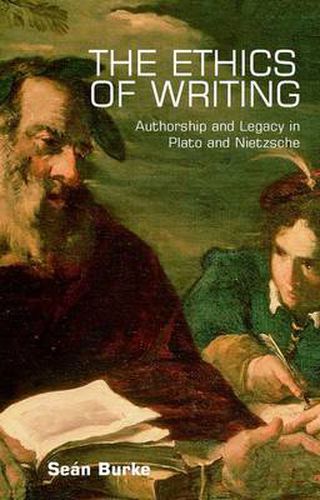Readings Newsletter
Become a Readings Member to make your shopping experience even easier.
Sign in or sign up for free!
You’re not far away from qualifying for FREE standard shipping within Australia
You’ve qualified for FREE standard shipping within Australia
The cart is loading…






Beginning amidst the tombs of the ‘dead’ God, and the crematoria at Auschwitz, this book confronts the Nietzschean legacy through a Platonic focus. Plato argues in the Phaedrus that writing is dangerous because it can neither select its audience nor call upon its author to the rescue. Yet, he transgresses this ethical imperative in the Republic which has proved defenceless against use and abuse in the ideological foundation of totalitarian regimes. Burke goes on to analyse the dangerous games which Plato and Nietzsche played with posterity. At issue is how authors may protect against ‘deviant readings’ and assess ‘the risk of writing’. Burke recommends an ethic of ‘discursive containment’. The ethical question is the question of our times. Within critical theory, it has focused on the act of reading. This study reverses the terms of inquiry to analyse the ethical composition of the act of writing. What responsibility does an author bear for his legacy? Do ‘catastrophic’ misreadings of authors (e.g. Plato, Nietzsche) testify to authorial recklessness? These and other questions are the starting-point for a theory of authorial ethics which will be further developed in a forthcoming book on the interanimating thought of Emmanuel Levinas and Jacques Derrida. Continuing the mission of the ‘returned author’ begun in his pioneering book The Death and Return of the Author, Burke recommends the ‘law of genre’ as a contract drawn up between author and reader to establish ethical responsibility. Criticism, under this contract, becomes an ethical realm and realm of the ethical. Key Features *An original, provocative and arresting construction of a new debate: the responsibility of authors for the effects of their works *Courageous discussion of catastrophic readings which played a part in the establishment of totalitarian regimes such as Nazism, Fascism, and Communism *An extension of the author’s pioneering work on authorship into its ethical and political significance
$9.00 standard shipping within Australia
FREE standard shipping within Australia for orders over $100.00
Express & International shipping calculated at checkout
Beginning amidst the tombs of the ‘dead’ God, and the crematoria at Auschwitz, this book confronts the Nietzschean legacy through a Platonic focus. Plato argues in the Phaedrus that writing is dangerous because it can neither select its audience nor call upon its author to the rescue. Yet, he transgresses this ethical imperative in the Republic which has proved defenceless against use and abuse in the ideological foundation of totalitarian regimes. Burke goes on to analyse the dangerous games which Plato and Nietzsche played with posterity. At issue is how authors may protect against ‘deviant readings’ and assess ‘the risk of writing’. Burke recommends an ethic of ‘discursive containment’. The ethical question is the question of our times. Within critical theory, it has focused on the act of reading. This study reverses the terms of inquiry to analyse the ethical composition of the act of writing. What responsibility does an author bear for his legacy? Do ‘catastrophic’ misreadings of authors (e.g. Plato, Nietzsche) testify to authorial recklessness? These and other questions are the starting-point for a theory of authorial ethics which will be further developed in a forthcoming book on the interanimating thought of Emmanuel Levinas and Jacques Derrida. Continuing the mission of the ‘returned author’ begun in his pioneering book The Death and Return of the Author, Burke recommends the ‘law of genre’ as a contract drawn up between author and reader to establish ethical responsibility. Criticism, under this contract, becomes an ethical realm and realm of the ethical. Key Features *An original, provocative and arresting construction of a new debate: the responsibility of authors for the effects of their works *Courageous discussion of catastrophic readings which played a part in the establishment of totalitarian regimes such as Nazism, Fascism, and Communism *An extension of the author’s pioneering work on authorship into its ethical and political significance